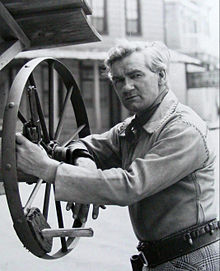Percy Herbert (actor): Difference between revisions
No edit summary |
No edit summary |
||
| Line 20: | Line 20: | ||
'''Percy Herbert''' (31 July 1920 – 6 December 1992)<ref name=BFI>{{cite web | url=http://ftvdb.bfi.org.uk/sift/individual/24840 | accessdate=24 May 2009 | publisher=BFI | title=Herbert, Percy | work=Film & TV Database }}</ref> was an English [[character actor]] who worked predominately during the 1950s, 60s and 70s, becoming one of the most recognisable faces in post war British cinema. |
'''Percy Herbert''' (31 July 1920 – 6 December 1992)<ref name=BFI>{{cite web | url=http://ftvdb.bfi.org.uk/sift/individual/24840 | accessdate=24 May 2009 | publisher=BFI | title=Herbert, Percy | work=Film & TV Database }}</ref> was an English [[character actor]] who worked predominately during the 1950s, 60s and 70s, becoming one of the most recognisable faces in post war British cinema. |
||
He served in the Royal Army Ordnanace Corps during the Second World War and spent four years in the notorious Japanese prisoner of war camp Changi. After the war he was helped by Dame Sybil Thorndike to secure an interview with the Royal Academy of Dramatic Art where he won a scholarship. His acting career began in the theatre, which included working at John Gielgud'a Old Vic Company. |
He served in the Royal Army Ordnanace Corps during the Second World War and spent four years in the notorious Japanese prisoner of war camp Changi. After the war he was helped by Dame [[Sybil Thorndike]] ]].<ref>{{cite web |url=http://wc03.allmovie.com/cg/avg.dll |title=Percy Herbert Biography |publisher=''[[Allmovie]]'' (allmovie.com) |accessdate=13 December 2007}}</ref> |
||
to secure an interview with the Royal Academy of Dramatic Art where he won a scholarship. His acting career began in the theatre, which included working at [[John Gielgud]]'a [[Old Vic]] Company. |
|||
Beginning his film career in the eraly fifties he went onto make nearly seventy films, often playing soldiers, most notably in ''[[The Cockleshell Heroes]]'', ''[[The Bridge on the River Kwai]] (for which he also worked as consultant),'' ''[[Sea of Sand]]'', ''[[Tunes of Glory]]'', ''[[The Guns of Naverone]]'', ''[[Guns at Batasi]]'' and ''[[Tobruk]]''. However, he was equally at home in comedies (''[[Barnacle Bill (1957 film)|Barnacle Bill]]'', ''[[Casino Royale]]'', two [[Carry On films]]), fantasy (''[[One Million Years B.C.]]'', ''[[Mysterious Island (1961 film)|Mysterious Island]]''), and drama (''[[Becket]]'', ''[[Bunny Lake is Missing]]''). |
|||
He also acted on television; he was a regular on the short-lived American series ''[[Cimarron Strip]]'', during a brief foray to Hollywood. Other television work includes ''[[Danger Man]]'', ''[[The Saint]]'', ''[[Z Cars]]'', ''[[Dixon of Dock Green]]'', and ''[[Worzel Gummidge]]''. |
|||
Herbert was a soldier and prisoner of war during [[World War II]], captured by the Japanese when they took [[Singapore]]. |
|||
He was discovered by Dame [[Sybil Thorndike]].<ref>{{cite web |url=http://wc03.allmovie.com/cg/avg.dll |title=Percy Herbert Biography |publisher=''[[Allmovie]]'' (allmovie.com) |accessdate=13 December 2007}}</ref> |
|||
Herbert died of a heart attack on 6 December 1992.<ref name=BFI /> |
Herbert died of a heart attack on 6 December 1992.<ref name=BFI /> |
||
Revision as of 16:20, 26 June 2012
This article needs additional citations for verification. (May 2009) |
Percy Herbert | |
|---|---|
 Herbert as MacGregor in Cimarron Strip, 1967. | |
| Born | 31 July 1920 |
| Died | 6 December 1992 (aged 72) |
| Occupation | actor |
| Years active | 1951-87 |
Percy Herbert (31 July 1920 – 6 December 1992)[1] was an English character actor who worked predominately during the 1950s, 60s and 70s, becoming one of the most recognisable faces in post war British cinema.
He served in the Royal Army Ordnanace Corps during the Second World War and spent four years in the notorious Japanese prisoner of war camp Changi. After the war he was helped by Dame Sybil Thorndike ]].[2] to secure an interview with the Royal Academy of Dramatic Art where he won a scholarship. His acting career began in the theatre, which included working at John Gielgud'a Old Vic Company.
Beginning his film career in the eraly fifties he went onto make nearly seventy films, often playing soldiers, most notably in The Cockleshell Heroes, The Bridge on the River Kwai (for which he also worked as consultant), Sea of Sand, Tunes of Glory, The Guns of Naverone, Guns at Batasi and Tobruk. However, he was equally at home in comedies (Barnacle Bill, Casino Royale, two Carry On films), fantasy (One Million Years B.C., Mysterious Island), and drama (Becket, Bunny Lake is Missing).
He also acted on television; he was a regular on the short-lived American series Cimarron Strip, during a brief foray to Hollywood. Other television work includes Danger Man, The Saint, Z Cars, Dixon of Dock Green, and Worzel Gummidge.
Herbert died of a heart attack on 6 December 1992.[1]
Partial filmography
References
- ^ a b "Herbert, Percy". Film & TV Database. BFI. Retrieved 24 May 2009.
- ^ "Percy Herbert Biography". Allmovie (allmovie.com). Retrieved 13 December 2007.
{{cite web}}: Italic or bold markup not allowed in:|publisher=(help)
External links
